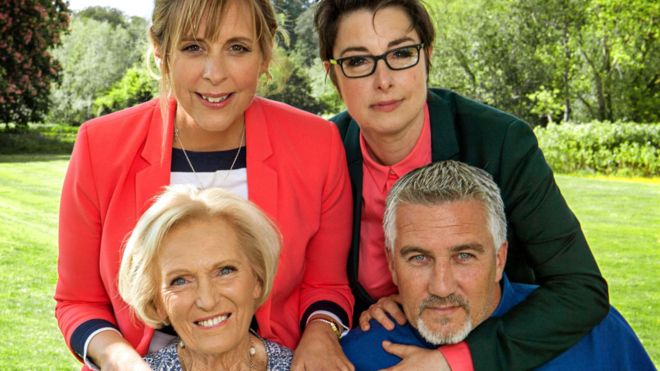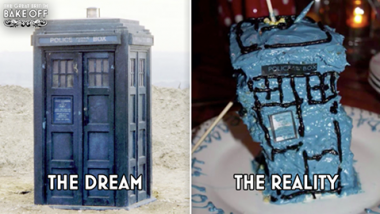Bake Off has sold its soul, and it's OK to be sad about it
Let me put my spatulas on the table: I'm no great fan of The Great British Bake Off, the unlikely British TV sensation which has this week severed ties with the BBC.

Love Productions, which makes GBBO, announced that from next year the show will move to Channel 4 after they offered £10m more per season, and as a result beloved hosts Mel Giedroyc and Sue Perkins made a counter announcement that they weren't "going with the dough". But as a non-fan, it was still obvious to me that the move, quickly dubbed 'Breadxit' by funny people on the Internet, had caused extraordinary levels of distress among the millions who love and watch the show.
Petitions were started, hate campaigns were waged, people composed strongly-worded tweets. The production company were painted as greedy, the TV channel as mean-spirited. Rupert Murdoch was blamed, as he almost always is. There was, it's no exaggeration to say, a public outpouring of grief. The general feeling was that GBBO, and indeed life, would never be the same again.
I may not spend my evenings watching people baking plum duffs in a tent, but I'm certainly not above over-reacting to unwelcome events in culture or entertainment. I was inconsolable for days when David Tennant left Dr Who, and I turn into an unreasonable and entirely irrational grump whenever England exits a major football tournament. So I'm not about to look down on those who care deeply about Bake Off and who are naturally upset to see such unwelcome change.

There is an easy (and very annoying) critique which regularly gets levelled in situations like this. It takes the outrage felt about a seemingly vacuous issue and compares it to the public's engagement with other issues. "If only people cared this much about... global poverty, politics, [insert your own cause here]." And of course there's truth in that. But right now, caught up in the emotion of the moment, that sort of sentiment just makes you want to shove the smart-alec's face into a black forest gateau.
It's OK to be upset about more than one thing. When Cecil the Lion (remember him?) was shot by a Minnesota dentist, people were criticised for feeling outrage when there were so many other apparently more significant tragedies going on in the world. But being upset about animal cruelty, or indeed about the fate of your favourite TV show, doesn't actually prevent you from feeling upset, angry and moved to activism by other things at the same time. You can be upset about the refugee crisis AND small issues in your social life. Our hearts are big enough to be upset about the growing need for foodbanks AND unpleasant behaviour on Celebrity Love Island.
That said, our strength of reaction to news events can often illuminate our priorities. And if we realise that we tend to fall into a deep depression when our favourite show gets cancelled, or when our team exits a sports tournament, but not when we see devastating stories of tragedy, then perhaps there is a little problem to be addressed. Such a realisation may reveal that we've become desensitised or prone to (awful phrase alert) compassion fatigue; or it might suggest that we've subtly begun to value entertainment, or maybe just TV, too much.
Or it might not even be that serious. Perhaps as we examine ourselves we'll simply come to see that we're prone to getting a little too attached to things that are ultimately of limited value. Either way, instead of criticising one another or feeling guilty, it's an opportunity to do a couple of things. Like a kind of moral version of carbon-offsetting, we can see this as a prompt to reconnect with some of the things which we know really do matter; to recalibrate our understanding of what real problems look like by investing ourselves in relieving them.
And perhaps the other thing we can consider is a bit of fasting, which seems rather an apt suggestion in the context of The Great British Bake Off. Rather than abstaining from food (or just cake) though, we might want to miss an episode of our favourite show, or a sports event, or whatever our particular cultural poison happens to be, just to make sure that there's nothing which is more important to us than seeking first God's kingdom and his righteousness (Matt 6:33). My friend Phil realised how sport had become far too important in his life, and took the extreme step of fasting from it completely for a year. You don't need to go that far, although I'm sure that many Bake Off fans will be avoiding cake for a while as an act of protest anyway.
It's OK to be upset about Bake Off. It's not terribly helpful to criticise those who are mourning it. But it is worth recognising our strength of feeling and reaction in moments like this, and asking ourselves if it reveals something about our priorities which we might want to address.
Now, having said all that, there are very legitimate reasons to be upset about the fate of GBBO. In a world of dreary reality TV shows, all based around a manufactured journey and creating short-lived clone celebrities, Bake Off was a delicious-smelling breath of fresh air. It was loved precisely because of its simplicity, its apparent ordinariness – normal people making cake because they like making people happy. To see that (potentially) ruined because of (allegedly) corporate greed is not only upsetting in itself, it's a reminder of the bigger issues we face in a society that proves over and again that you can't love both money and the good stuff that we Christians call the Kingdom (but others call dessert).
Perhaps what we're really reacting to then, is a clash of values. On the surface that's about cake and TV channels, but deep down it's about the conflict between the society we aspire to and the dominant form of capitalism that most of us assent to. We want a lovely-tasting, quintessentially-British life punctuated with gentle innuendos about soggy bottoms, where we're all supportive of each other; in fact, that's pretty much the worldview that the Church should be offering. Yet that's not the world we live in, and while moments like this are painful for some, they are an important reminder of that fact. And maybe that is something worth getting worked up about, after all.
Martin Saunders is a Contributing Editor for Christian Today and the Deputy CEO of Youthscape. Follow him on Twitter @martinsaunders.











